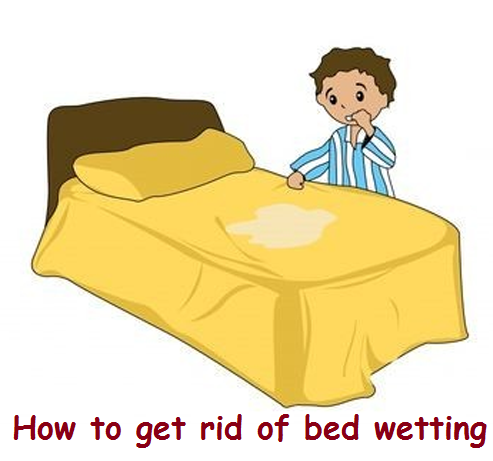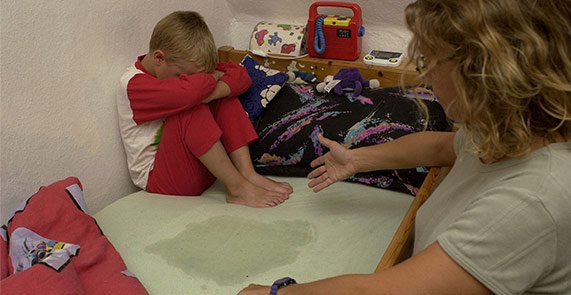Overcome the challenge of bed wetting
Overcoming the challenges of bedwetting
We will look at the causes of this very common phenomenon and what parents can do to help their children tackle this often embarrassing and traumatic issue.
Bed wetting is a loss of bladder control, a form of enuresis. The definition of enuresis is: An involuntary voiding of urine during sleep with a severity of at least 3 times a week in children over the age of 5, in the absence or congenital or acquired defects of the central nervous system.
Trish Holgate a social worker who specialises in counselling children, says " a child under the age of about 4 years who is wetting their bed should really not be considered enuretic. While the parent may long for dry sheets, the child may still not have required bladder control. Even once dryness has been achieved the odd wet bed can be expected. It should resolve itself by about the age of seven. Achievement of night-time dryness varies enormously, so comparisons should be avoided."
We get two types of enuresis. Primary enuresis refers to when a child has never managed to achieve dryness at night. There are three contributing factors namely going into a very deep sleep and not waking up from the sensation of a full bladder, the over production of urine while sleeping known as polyuria, which is caused by a lack of an antidiuretic hormone and affects 60% of sufferers and thirdly having a small functional bladder capacity.
Secondary enuresis refers to children who have achieved dryness at night but then begin wetting their beds again. This could happen because of urinary tract infection and congenital defects or constipation.
A child needs to be evaluated so that secondary causes could be ruled out and a diagnosis of primary enuresis can be made.
It is very interesting to know that enuresis is three times more likely to occur in boys and a child is 70% more likely to develop the condition if both parents were enuretic themselves suggesting a strong hereditary link. There are also those people who think there is an emotional cause for secondary enuresis because it causes high levels of anxiety. This can be brought on by any big change such as starting school, moving home, illness, divorce or the birth of a new sibling. Even events that we may consider insignificant may cause a child anxiety. A child who is not able to express anxiety appropriately may well begin to wet his or her bed.
Nocturnal enuresis was once thought to be a psychological condition but now studies indicate that the enuresis itself is likely to be the cause of a child's anxiety and emotional problems. In a recent survey in Denmark children were asked what would be most traumatic for them. They said the worst thing would be if one of their parents died and secondly wetting their beds.
Contrary to how it may seem sometimes, a child who wets his/her bed is not always manipulative or naughty or being just stubborn. It is not their intention to keep you the parent slaving over the washing.
If you and your child is batting with this problem, you need to consider possible underlying causes so that they can be addressed. If you are armed with some understanding, you will feel like you have more of a plan and you will be able to respond appropriately.
Bedwetting solutions:
Solutions vary, depending on the cause and the nature of the enuresis.
- The attitude of you as the parent plays a vital role in addressing this problem. Attacking, shaming or punishing the child will only increase the child's anxiety levels and exaggerate the problem.
- Remain calm and emotionally contained and show confidence in the child's ability to eventually control his bladder function.
- Often when you let your child know that you also suffered from this when you were small provides comfort and reassurance for the child.
- If you are concerned let your GP examine the child and advise you of the appropriate steps to take.
- If the problem is a over production of urine , medication such as a antidiuretic hormone can be given to slow down urine production.
- Changes in the child's diet can also help. Certain foods such as diary products, acidic food, carbonated drinks and caffeine can irritate the bladder.
- The use of a bed alarm in stopping bed wetting is quite successful It consists of a sensor that is placed inside the child's underclothes and is connected to an alarm that goes off if the child starts to urinate.
You can find more remedies here
https://www.bodyworxphysio.com.au/2016/09/08/bed-wetting-childhood-incontinence-can-physiotherapy-help/
What we as parents need to keep foremost in mind is that bed wetting is not bad behavior that needs to be punished. Each child is different and each one will eventually gain total bladder control.
With your support and encouragement as parent you can help to make this a smoother, easier process for your children.
If you enjoyed this post follow me @stardust or resteem my content.



Very nice post! Up&Resteem
Thank you saqib.
Welcome @stardust
Thanks! I have been trying to stop for 60 years maybe this will help :-)
Sorry to hear, I also hope this will help ;-) you are always so funny thank you for the comment.
You are welcome but what if I was not being funny?
Well then I will take it very serious, and ask for forgiveness for my wrong assumption.
😁
Interesting post
Thank you rynow :-)